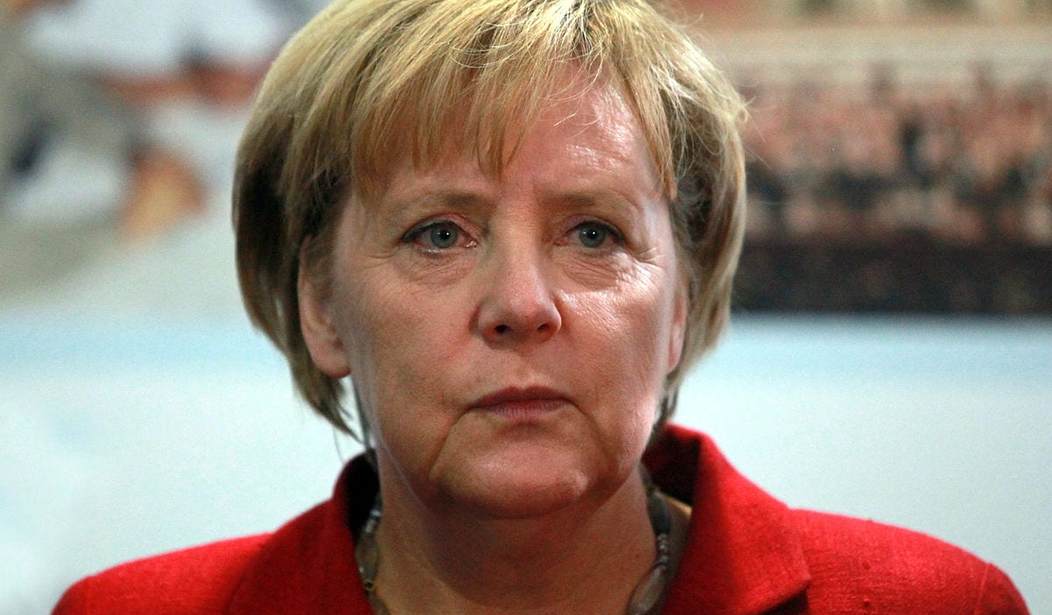Germany’s leaders have nothing of signifcance to say about the worst outbreak of sexual assaults in Germany since the Red Army moved out after World War II. Why won’t they do anything? Answer: for the same reason that the Catholic Church insists that Islam is a religion of peace. The alternative–watching from a distance a civilizational collapse in real time with its attendant horrors–is too terrible for Angela Merkel or Pope Francis I to contemplate. They would rather take casualties than absorb the horror of the situation. The root of the problem is theological. The West is paralyzed by its own notion of the good.
Over at Jihad Watch, Robert Spencer quotes Archbishop Bruno Forte’s claim that “Islam teaches ‘non-violence in the name of God,” adding:
How could an organization that claims to speak for God and to be led by the Holy Spirit be so indefatigably committed to a lie? For it isn’t only Bruno Forte: the Pope has said the same thing, and it’s the official policy of the U.S. Conference of Catholic Bishops, which winks at dissent on any number of actual Church teachings, but moves ruthlessly to suppress voices that dare to suggest that maybe Islam is not a Religion of Peace. It appears as if protecting the image of Islam is more important to Church leaders today than teaching the contents of their own faith.
I predicted that Germany’s leaders would do nothing about mass sexual abuse by Muslim immigrants in an Oct. 14, 2015 essay at Asia Times. Some extracts:
Germany’s elite knows perfectly well that the migrants bring social pathologies, because they have already seen the world’s worst sex crime epidemic unfold in Scandinavia. Sweden now has the highest incidence of reported rape outside of a few African countries, and nearly ten times the rate of its European peers—and all this has happened in the past ten years. Sweden ranks near the top of the World Economic Forum’s Gender Gap Index, yet it has become the most dangerous country for women outside of Africa, with an incidence of rape ten times that of its European peers. Sweden’s political leaders not only refuse to take action, but have made it a criminal offense to talk about it.
Even in liberated, feminist, gender-neutral Sweden, there is something more horrible than rape, something horrible enough to persuade the political elite to sacrifice the physical and mental health of tens of thousands of Swedish women. That is the horror of social disintegration in the Muslim world.
Horror does not deter Muslims, because Muslims see the world in terms of unconstrained will. Allah’s will governs the spin of every electron and the path of every bullet. It is unfathomable and arbitrary, like nature in the pagan world. Islam can endure horror, but not humiliation. But horror is the Achilles’ heel of the Christian world, whose founding premise is that God offers unselfish love and unmerited grace to mankind, and in a sense stacked the deck in favor of goodness. The perception that the universe is cruel and without purpose is poison to Christianity. That is the great paradox of salvation: If God’s unselfish love and unmerited grace offer salvation to all humankind, what are we to make of those to willfully reject it?
The impulse to open Germany to Muslim refugees is irresistable for Germany’s elite, prominently so in the case of Chancellor Angela Merkel. To understand her motives one must consider that she is not only a German, but also a Christian. “Belief in God and closeness to the church have molded me and occupied me since my childhood,” she wrote in an essay entitled “Why I am a Christian” just before her election victory. A pastor’s daughter, she grew up in atheist East Germany and maintained her belief despite the hostility of the state and her peers. “Since my youth I knew that I followed an inner compass through my commitment to God and his Church, one that was rejected by the [East German] state and the majority of the population. It was not always easy to stand by Christ. In contrast to most young people I went to Christian instruction and confirmation classes, rather than to the [state] ceremonies for youth.”
All the promises of heavenly bliss are not worth the torment of a single child, said Ivan Karamazov. The image of one drowned boy overwhelmed Europe. Only a few hundred thousand people have died in Iraq and Syria during the past fifteen years, but zeros could appear to the right of the death toll before long. Whether the migrant tidal wave arose spontaneously, or whether it was channeled by Turkey, is a secondary question. The Christian mind cannot absorb the horror of human suffering on an apocalyptic scale, and what we see now is tiny compared to what is likely to come next.
Judaism is more resilient in the face of horror, I think, because it assigns to humankind a higher degree of freedom, that is, the radical freedom to enter into partnership with the creator of the world and transform nature itself. The God that Judaism encounters in the world in which we find ourselves–this God, and not a God that satisfies the sensibilities of philosophers or theologians–left Creation intentionally incomplete so that man might have the freedom to become a partner in the work of creation. Chaos in the natural world and human wickedness are a divine challenge to humankind to rise to the status of co-creator. The possibility of radical freedom, of course, also implies the possibility of radical evil.
The Christian is reborn into the Church and enters its community as an individual. The Jew already was present in the congregation at Mount Sinai, where all Israel, including all future generations, heard the voice of God from the fiery mountain. The Christian ponders why bad things happen to good people; the Jew prays each morning in good times and bad, “How fortunate are we. How good is our portion, how pleasant our lot, how beautiful our heritage.” The deliverance at the Sea of Reeds is not a past event and Israel’s ultimate redemption is not a mere future: Judaism is simply the construction of a present in which all generations rejoice in Israel’s inheritance, and provide a context against which an individual’s suffering is measured. One might ask with Ivan Karamazov whether all this is worth the suffering of a single child. In the Jewish perception, it is worth it to God–not an abstract God, not a designer God to whom we attribute our own sensibilities, but YHWH with whom Abraham and Moses spoke.
The jihadists know just how to manipulate Western sensibilities. Catastrophic casualty levels are part of the program, at least in a number of theaters. Hamas in Gaza was the first combatant in history to deliberately maximize the number of casualties among its own civilians (by firing thousands of missiles at Israel during the summer of 2014 from densely-populated civilian areas). The Israel-Palestine conflict, though, is a sideshow in the Middle East; the disintegration of Libya, Syria, Iraq, Somalia, South Sudan and Yemen and the latent instability of Pakistan and other Muslim countries.
Only a few hundred thousand people have died in Iraq and Syria during the past fifteen years, but zeros could appear to the right of the death toll before long. Whether the migrant tidal wave arose spontaneously, or whether it was channeled by Turkey, is a secondary question. The Germans–the best Germans, like Chancellor Merkel–cannot absorb the horror of human suffering on the present scale, and what we see now is tiny compared to what is likely to come next.
Read the whole essay here.
A final thought: At one end of the Christian spectrum, the doctrine of universal salvation requires us to believe that everyone is potentially good, or at least receptive to the good. Merkel is inclined towards this view, as are most German Christians (who believe that for them to be forgiven, everyone has to be forgiven). I suspect that Pope Francis thinks this way, too. George W. Bush, a mainline Methodist, also is a universal salvationist, judging from his Second Inaugural Address. At the other end of the Christian spectrum we have the Calvinist assertion that grace is given only to an Elect. America’s Civil War was the great Calvinist crusade against evil, when Union soldiers sang a paraphrase of Isaiah 63. If we insist on believing that there is an inherent good in everyone, the likes of the Nazis, the Iranian Revolutionary Guards and ISIS will provide massive evidence to the contrary, and we will be paralyzed with horror–like Germany’s leaders today.










Join the conversation as a VIP Member